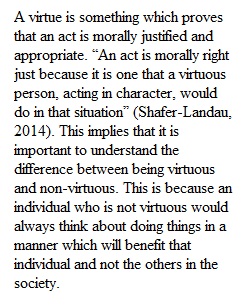


Q Read: Shafer-Landau Chapter 17 – Virtue Ethics, Chapter 18 - Feminist Ethics Powerpoint- Virtue and Vices, The Ethics of Diversity Book Assignment Ideas pick one or multiple or answer one or multiple discussion questions at the end of each chapter, you can discuss one discussion question in all three paragraphs or you can answer more than one discussion question: • What is a virtue? How are virtues acquired? Do you agree with Aristotle's claim that virtue is essential to the good life? Why or why not? • How do we come to have moral knowledge, according to virtue ethics? In what way does this account of moral knowledge differ from the accounts given by previous theories? Which do you think is better, and why? • In what ways have Western philosophers traditionally marginalized and shown disrespect for women? How does feminist ethics seek to address this problem? • What are some of the distinctive experiences of women, and how have feminist ethicists suggested that these should inform our moral theorizing? Do you think they are correct in thinking this? Minimum 250 words- Drop in Weekly Assignment DropBox (Maximum 30% originality) (See Guidelines) What is a virtue? How are virtues acquired? Do you agree with Aristotle's claim that virtue is essential to the good life? Why or why not?
View Related Questions